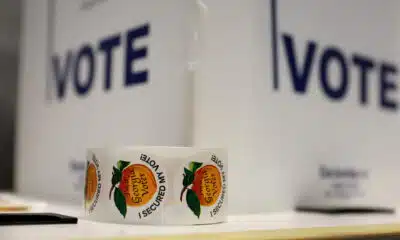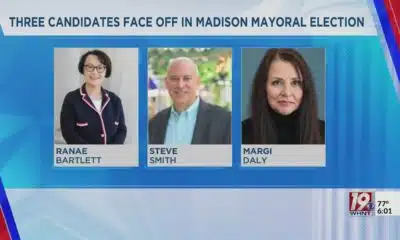News from the South - Texas News Feed
Trump delays mercury pollution rule, helps Texas power plants
“Texas power plants and chemical companies benefit as Trump eases pollution rules, experts say” was first published by The Texas Tribune, a nonprofit, nonpartisan media organization that informs Texans — and engages with them — about public policy, politics, government and statewide issues.
Sign up for The Brief, The Texas Tribune’s daily newsletter that keeps readers up to speed on the most essential Texas news.
The nonprofit publication Capital & Main produced this article. It is co-published with permission.
For Donna Thomas, smokestacks are a typical sight from her home in Fort Bend County. Since she was a child, she has seen the coal and natural gas-powered W.A. Parish Generating Station puff clouds of haze during the day and light up brightly at night. The facility — which has been around since 1958 — is both part of the background and all she thinks about.
Thomas is not alone. For decades, residents have expressed concerns over the pollution emitted from the Parish coal plant — a separate facility from the natural gas plant — and called for its closure. The plant, located about 30 miles southwest of downtown Houston, is ranked by Texas environmental regulators as one of the worst polluters in the state for certain hazardous emissions. These include mercury, a toxic heavy metal particularly harmful for children and pregnant people.
This year, mercury has been top of mind for environmental activists and residents like Thomas. In April, President Donald Trump announced an exemption for companies from implementing stricter Biden-era mercury regulations for two years. Of the 163 eligible coal plants, 11 are in Texas and six have been approved, including Parish’s operator, NRG Energy. In Missouri and Illinois, five coal plants have been exempted, and in Pennsylvania, all 12 of the coal plants seeking approval have been approved.
Then in July, Trump exempted chemical companies for two years from Biden’s 2024 HON Rule, a set of regulations that control hazardous air emissions from chemical plants called the Hazardous Organic National Emission Standards for Hazardous Air Pollutants.
The Trump administration determined the exemptions are in the country’s best interest and represent a burden on industry, and that the technology is not available to meet stricter regulations. Companies like NRG agree.
However, critics say the Biden administration’s 2024 Mercury and Air Toxics Standards — called MATS for short — and the HON Rule were long overdue and the two-year delay in implementing them is merely a tactic to protect industry profit margins at the expense of public health.
Moreover, critics point out that the MATS delay may be giving companies the freedom to ignore toxic air emission rules until the Trump administration repeals the Biden-era regulations altogether. In June, the Environmental Protection Agency under Trump proposed a rule to eliminate the 2024 MATS rule completely.
The two rules together have set off alarm bells for experts and environmentalists in Texas, home to one of the world’s largest petrochemical sectors and 11 coal-powered plants. The exemptions will run from 2027 — when the Biden rules were supposed to take effect — to 2029.
“We know these rollbacks are not good for anyone, especially for those that are community fenceline,” said Thomas, also the founder and president of the Fort Bend Environmental — a grassroots organization focused on environmental justice. “We have around 1,000 homes within three miles of Parish, so that’s going to affect all of them.”
A two-year delay
The EPA has been working on stricter environmental regulations for chemical plants since the early 1990s. Only in 2020 did Biden’s EPA begin drafting new rules in earnest.
But owners of the chemical plants should not act so surprised, said Neil Carman, a former regulator for the Texas Commission on Environmental Quality.
“The chemical industry has known for decades that this was all coming, but they don’t like rules, because it means they have to put on more pollution control and they have to do more leak inspections,” said Carman, now the clean air director for the Texas chapter of the Sierra Club. “These plants will always tell you safety first, safety first, but then you run into this thing called money.”
Of the 79 chemical facilities in Texas requesting exemptions, 15 have been approved, including 13 along the Gulf Coast and the so-called petrochemical corridor.
Carman pointed out that the heads of chemical companies have been in talks with Trump’s EPA since the election. In March, the administration announced that companies could apply for exemption from MATS, HON and seven other sets of emissions standards.
That same month, EPA Administrator Lee Zeldin met with Dow Inc. Chair-CEO Jim Fitterling to discuss regulations imposed by the Biden administration, according to public records and emails obtained by the Sierra Club.
In one email sent on March 17, Dow reps asked to discuss “clarity” on the EPA’s recent announcement that it will reconsider the HON rule and “Dow has met with the Office of Air and Radiation regarding an extension of the current compliance deadline, which is impossible to meet.”
In May, Zeldin met with Fitterling and other chemical company CEOs to discuss the industry at large. Then in July, Trump announced the exemptions for HON, including for two chemical plants in Louisiana and one in Seadrift, Texas, operated by Dow and its subsidiary Union Carbide.
In a statement to Capital & Main, a Dow spokesperson said that “safety and integrity are at the core of both companies’ operations” and the “extensions are appropriate and necessary to address the technical challenges and to ensure the continued safe and efficient operation of these facilities.”
Carman doesn’t buy it. He worked as an environmental regulator in Texas for 12 years. Even then, he said, companies never seemed to be able to find the budget to limit their emissions and chemical leaks. For him, it’s still the cost.
“A lot of these are old plants and so when they go in and do all this work,” Carman said, “they have to find a place where they’re going to put in new controls and they have to engineer it. They have to design it all. It’s months of planning, but these rules were out there. They knew they were coming. They just want two more years of delay.”
Limiting mercury
When the EPA implemented the 2012 MATS rule, mercury emissions dropped 86% — or four tons — in five years.
In 2024, Biden’s EPA approved a rule to strengthen MATS by tightening the emissions standards for mercury by another 70% and reducing pollutants discharged through wastewater from coal-fired plants by more than 660 million pounds per year.
The rule could prevent as many as 11,000 premature deaths, 2,800 cases of chronic bronchitis and 130,000 asthma attacks, according to the EPA under Biden.
However, in April, Trump approved the exemptions for 47 coal-powered plants across the nation. As of mid-August, 70 are now exempted, including Parish.
“These rules were just so critically important to people’s health,” said Surbhi Sarang, senior attorney for the Environmental Defense Fund. The Trump administration “was doing this process that was just not transparent. I mean, there was no process. Whereas in rulemaking, there’s public comment. This is just like a presidential action that was kind of taken in a vacuum and then announced.”
In response to the exemption, Erik Linden, senior director of communications at NRG, said the time is needed and will be used to evaluate the technology for air quality systems and monitoring equipment for compliance.
“All existing MATS emission controls will be properly maintained and remain in service,” Linden said of the current MATS rules that began in 2012. The exemption would give NRG until 2029 to implement the changes.
However, in July, Trump’s EPA proposed eliminating Biden’s rule entirely by the end of the year. Interested parties had three weeks to submit comments, and the Environmental Defense Fund’s request for an extension was denied.
“Rule-making usually takes 12-18 months if not longer,” Sarang said. “They’re moving very quickly.”
All of this is alarming for residents living near industry. With the extent of the changes to environmental regulations coming down from the Trump administration, there’s a lot for Thomas, the Parish generating station neighbor, to process. But she hasn’t given up. Increasingly, Thomas is talking to her neighbors and fellow residents about fighting back.
This means sending letters to representatives in Texas and in Washington, D.C. Thomas said it pays to be loud.
Parish is “going to do the same thing it’s been doing,” Thomas said. “If the EPA does not put a stop to these [emissions] getting out, then everyone is going to pay for this with their lives and in their water and in their air.”
Disclosure: Environmental Defense Fund and NRG Energy have been financial supporters of The Texas Tribune, a nonprofit, nonpartisan news organization that is funded in part by donations from members, foundations and corporate sponsors. Financial supporters play no role in the Tribune’s journalism. Find a complete list of them here.
Copyright 2025 Capital & Main
More all-star speakers confirmed for The Texas Tribune Festival, Nov. 13–15! This year’s lineup just got even more exciting with the addition of State Rep. Caroline Fairly, R-Amarillo; former United States Attorney General Eric Holder; Abby Phillip, anchor of “CNN NewsNight”; Aaron Reitz, 2026 Republican candidate for Texas Attorney General; and State Rep. James Talarico, D-Austin. Get your tickets today!
TribFest 2025 is presented by JPMorganChase.
This article originally appeared in The Texas Tribune at https://www.texastribune.org/2025/08/27/texas-trump-mercury-rule-mats-coal-power-plants-pollution/.
The Texas Tribune is a member-supported, nonpartisan newsroom informing and engaging Texans on state politics and policy. Learn more at texastribune.org.
The post Trump delays mercury pollution rule, helps Texas power plants appeared first on feeds.texastribune.org
Note: The following A.I. based commentary is not part of the original article, reproduced above, but is offered in the hopes that it will promote greater media literacy and critical thinking, by making any potential bias more visible to the reader –Staff Editor.
Political Bias Rating: Center-Left
The content focuses on environmental regulations and critiques the Trump administration’s rollbacks of Biden-era pollution controls, emphasizing the potential public health risks and environmental justice concerns. It highlights the perspectives of environmental activists and regulatory experts who advocate for stricter pollution standards, while portraying industry and the Trump administration’s actions as prioritizing economic interests over health and safety. This framing aligns with a center-left viewpoint that supports stronger environmental protections and regulatory oversight.
News from the South - Texas News Feed
It's a love story: Taylor Swift, Travis Kelce announce engagement
SUMMARY: Taylor Swift and Kansas City Chiefs tight end Travis Kelce are engaged, announcing it on Instagram with a photo of Kelce proposing in a garden and showcasing Swift’s dazzling “Old Mine brilliant cut” ring. The couple, both 35, began dating in 2023 after Kelce attended Swift’s Eras Tour. Despite early challenges, including Kelce’s unsuccessful attempt to give Swift a friendship bracelet with his number, their relationship blossomed. Swift has supported Kelce at numerous games, including two Super Bowls, while Kelce frequently attends her concerts. Their relationship has garnered massive media attention and was featured in ESPN’s documentary “The Kingdom.” Kelce’s parents praise their bond as genuine and deserving.
The post It's a love story: Taylor Swift, Travis Kelce announce engagement appeared first on www.kxan.com
News from the South - Texas News Feed
We're excited for National Dog Day!
SUMMARY: To celebrate National Dog Day, the studio welcomed three dogs: Mac, Sandy, and Leo. Sandy sports a playful lipstick kiss from Kim Castro, while lively one-year-old Leo kept everyone entertained. The dogs’ owners, also producers, shared that it’s usually breakfast, walk, or nap time for them. The studio enjoyed the furry therapy vibe and encouraged viewers to treat their dogs with special offers from PetSmart (buy one, get one 25% off on treats), Lazy Dog Restaurant and Bar (coupon with dog bowl and entree), and free Puppuccinos from Starbucks. Viewer-submitted dog photos added to the joyful celebration of our furry friends.
We had in-studio guests to help us celebrate.
News from the South - Texas News Feed
Racism Wrapped in Rural Warmth
Rural Texas wears a friendly facade. You know everyone, and everyone treats each other so kindly, but, if you’re Black, you just ignore the stares when you walk into the local steakhouse for fish fry night.
I was 7 or 8 when I realized I would always be treated differently than my white friends. It was picture day and I was waiting in line near our classroom and watching as my teacher fixed every girl’s hair. I eagerly waited for her to fix mine, but she never did. I assumed it was because my hair was already twisted into three cute ponytails, a classic hairstyle for little Black girls.
But when I got home and asked my mom, she told me my teacher didn’t know what to do since my hair had a different texture than my friends’.
When I was in the seventh grade, I was called the n-word. I didn’t need to ask my mom what the word meant; I already knew. You’re taught at a young age if you’re Black. You’re taught never to say that word. It’s a slur. It’s a dirty word. The kid who called me that slur was a bully and I was a straight-A/B student. I never did anything wrong. (I can’t even tell you what detention was like!) My mom expected the best, so I became the best I could be. I remember telling her and crying. I was hurt.
A day later, he apologized after my mom told the school. I was surprised the school took action even in the early 2000s. I don’t recall being called that slur again. This was part of the good side of growing up in a place I’ll call “Smallstown” (since I still live here), a southeast Texas town where about one in five residents is Black. Many people try to do the right thing.
But throughout my academic and personal life, I experienced subtler forms of small-town racism—warm and welcoming with flashes of ugliness.
In 2005, my brother, mom, and I went to a local clothing store to buy a suit for his high school prom. As soon as we opened the door, we were immediately greeted. You would think that would be amazing customer service, but it wasn’t friendly. Family friends, who are also Black, told us they’d gotten the same greeting—it was pure racism.
Being stopped at the door was embarrassing. My family doesn’t steal. If I can’t afford it then I don’t need it. No one in my family has shopped there since. But to this day, I still get followed at a local big box store, especially when I’m eyeing the latest gaming systems.
My mom raised me to be intelligent and to think creatively. I grew up around books and learned about the world around me. I was raised on academics and hoped my smarts and studies would take me far.
Sometimes I was made fun of for talking “white.” (To this day, I have no idea what that meant.) I didn’t speak like the other Black kids did so I suppose that gave others something to laugh about—a kind of reverse racism.
In high school, I discovered a love for rock music. I was the only Black girl at Smallstown High who listened to rock. I loved Slipknot and other popular bands. I still do. I remember a particularly odd moment in history class my senior year. Our teacher was a coach and, for him, the stereotype was true: Coaches that teach often don’t care about the subject. One day my musical preferences came up in class and the teacher said, “You’re a Black girl who likes rock music? I would have dated you in high school.” Everyone thought that was weird.
In 2007, I escaped Smallstown to attend Sam Houston State University (SHSU) in Huntsville, where fortunately, I had fewer experiences with racism. But I recall that when Barack Obama was reelected I and other Black students got a text warning us to stay indoors. Otherwise, nothing stood out. I felt my race didn’t matter in Huntsville. The “townies” (we loved calling Huntsville people that as if they were the visitors and we weren’t) treated me differently only because I was a college student—a younger, less-rooted resident. On campus, we treated each other like longtime friends. I joined the Black Student Alliance, the NAACP, and the Program Council. I befriended many people who didn’t treat me differently because of my race.
For years, I wondered why, and I think it’s because so many SHSU students grew up in bigger cities. When I mentioned how insular Smallstown was, they seemed confused. By the time I graduated, I had learned a lot about myself. The lessons I learned and the people I met stay with me.
But then I moved back to Smallstown. Some strangers stopped me to ask if I was aware of what shirt I was wearing. (Yes, it featured my favorite heavy metal band.) And others still spoke to me as if I were a child. I was shocked to realize that my experiences as a Black woman in rural Texas wouldn’t change just because I had gained a bachelor’s degree.
I started working at a grocery store after college. The managers there never treated me differently due to my race—they treated me well because I was a hard worker. But some customers dealt with me differently because I was Black. The store had a small gas station, and I worked inside a little kiosk surrounded by fuel pumps. Every now and then, some white customers treated me as if I knew much less than the white co-workers I’d trained.
Compared to Huntsville, Smallstown has a big socioeconomic divide. Generations of white families in our town were able to buy homes and grow businesses while Black families were redlined and segregated and forced to attempt to break generational curses. But rich White people generally were less racist while poorer ones tended to belittle Black people. I found the nicest visitors to the grocery store were often ranchers and farmhands who drove in from the country.
I often wonder what would spark a change in the attitudes people have about Black people in small-town Texas. I hope that people like me, and the younger generations, will be able to inspire a much-needed change. Change comes from within and through open discussions. Frankly, I would have expected that racism would have faded already by 2025, but it hasn’t. People seem stuck in denial and defense mode whenever a Black person speaks about racism. You hear: “Oh, I can’t be racist because I have a Black friend,” or, my personal favorite, “There’s not a racist bone in my body.”
For real change to happen, people need to be ready to recognize things within themselves. I am hoping to open some eyes by sharing some of my experiences about being a Black woman in rural Texas.
The post Racism Wrapped in Rural Warmth appeared first on www.texasobserver.org
Note: The following A.I. based commentary is not part of the original article, reproduced above, but is offered in the hopes that it will promote greater media literacy and critical thinking, by making any potential bias more visible to the reader –Staff Editor.
Political Bias Rating: Center-Left
This content focuses on the personal experience of a Black woman facing racial discrimination in rural Texas, highlighting systemic and interpersonal racism. The narrative advocates for recognition of racial issues and social change, which aligns with values typically associated with center-left perspectives emphasizing social justice and equity. While it critiques aspects of society and calls for progress, it does so through personal storytelling rather than overt political rhetoric, avoiding extreme or highly partisan language.
-
Our Mississippi Home7 days ago
MSU Unveils Mixed-Use Development Featuring Boutique Hotel, Cultural Landmark
-
News from the South - Alabama News Feed7 days ago
Grants to boost local emergency alert systems in question as public media agency closes
-
News from the South - Arkansas News Feed6 days ago
New I-55 bridge between Arkansas, Tennessee named after region’s three ‘Kings’
-
News from the South - Arkansas News Feed7 days ago
‘Alligator Alcatraz’ probed by Dems as ICE detention centers multiply in states
-
News from the South - Texas News Feed3 days ago
DEA agents uncover 'torture chamber,' buried drugs and bones at Kentucky home
-
Local News7 days ago
Winged ferry that glides like a pelican tested for coastal transportation
-
News from the South - North Carolina News Feed7 days ago
How civics class could stage a comeback in NC schools
-
News from the South - Louisiana News Feed6 days ago
Families with citizen children deported by ICE sue Trump administration











































